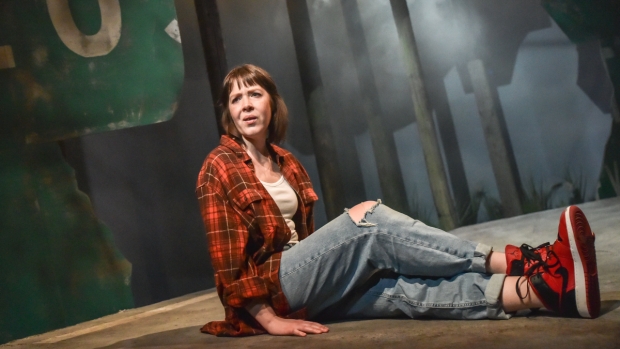
© Robert Day
Children raised by wolves and other ‘feral' kids make for enduring legends. They raise the question of whether animals might be capable of bringing up humans. But Ché Walker's gutsy and subversive new play Wolf Cub instead wonders whether humans are in fact qualified to bring up other humans.
The one-woman show sees a girl, Maxine (Clare Latham), narrating her ascent to adulthood in fractious 1980s America. She endures dreadful neglect from an abusive father, and later drifts into a life of wrongdoing. But her monologue serves to highlight the savage hypocrisy of societies which may themselves be criminal or corrupt.
Wolf Cub doesn't take long to bear its teeth. One early scene depicts an adolescent Maxine torturing a bunny to death, just for the hell of it. (This is not even the most visceral moment.) The girl believes she has an inner wolf; a primal alter-ego which surfaces time and again during her tough upbringing. Latham works the metaphor with wild-eyed intensity, though stops short of howling at the moon.
The play is particularly concerned with differentiating between contrasting types of violence. There's violence that results from a person's natural impulses – we're all animals, after all – and then there's systemic violence perpetuated by human-made structures (generally man-made structures).
Trapped in a vicious cycle, Maxine's childhood indiscretions gradually escalate into drug-selling in a Latin American gang. Walker makes clear that this is also a specific criticism of Ronald Reagan's war on drugs and his policies in Nicaragua, which he believes led to the divided USA we see in 2022. A neat touch sees an earthquake-induced fault line literally split the stage in two at one point.
Written in the aftermath of Donald Trump's 2016 election win, Walker's play validly makes the case that certain social scars exposed by that particular presidency are eternal. Wolf Cub looks at ongoing problems like racial injustice, and traces them back several decades – indicating similarities between the infamous 1991 police beating of Rodney King and the 2020 murder of George Floyd.
Just when you start to conclude that the world is little more than one big, cruel wilderness, the playwright starts to suggest warm touches of humanity in the unlikeliest places. It's there in drug barons Big Man, who becomes the father Maxine never had, or Fast Track, her eventual boyfriend, who repays a stash of borrowed crack cocaine with an invitation for a civilised game of tennis. The storytelling is detailed, and the noirish blur between the goodies and baddies quite compelling.
Maxine's personal shape-shifting is no less compelling, as she's observed growing from girl to teenager to woman – albeit on a sad arc. Her wolverine transformations lend the show an air of magical realism. These moments are attended with a subtle musical motif that comes courtesy of Olivier-winning stage star Sheila Atim; employed here in a less familiar guise as a composer.












